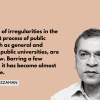Corruption highest in law enforcement
Law enforcement agencies were the most corrupt among 18 departments and sectors in providing services to households last year, says a survey report of Transparency International Bangladesh (TIB).
Passport offices and Bangladesh Road Transport Authority (BRTA) were the second and third most corrupt service-oriented entities, the anti-graft watchdog said in its report “Graft in Service-oriented Sectors: National Household Survey 2017”.
According to the report, 66.5 percent of the households surveyed fell victim to corruption in the service-oriented sectors.
Law enforcement agencies most corrupt: TIB by Daily Star on Scribd
Of those who sought services from law enforcement agencies, 72.5 percent became victims of corruption.
The report also mentioned that 63.1 percent of the households that sought services from BRTA had to pay bribes. The percentage was 60.7 percent in the case of law enforcement agencies and 59.3 percent for passport offices.
The TIB disclosed the findings at a press conference at its office in the capital yesterday.
The report said an estimated Tk 10,688.9 crore had been exchanged in bribe in the service-oriented sectors last year. The figure was Tk 8,821.8 crore in 2015.
The amount of bribe paid by the households was 0.5 percent of the country's GDP in fiscal 2016-17 and 3.4 percent of the national budget (amended) for the same fiscal year, it added.
Members of law enforcement agencies got involved in corruption, misbehaved with service seekers, threatened and implicated them in “false cases”, detained them without complaints, made delay and showed negligence in filing general diaries and cases, resorted to extortion, and also made delay in providing passport verification reports, the report pointed out.
Besides, service seekers faced delay and suffered negligence in getting passports.
They were forced to take help from middlemen, and became victims of fraudulence at passport offices, it mentioned.

Households had to pay bribes to BRTA officials and staffers for different services, including issuance and renewal of driving licences, registration and fitness certificates.
People also fell victim to corruption in getting judicial and land-related services, and in the education and health sectors.
The TIB conducted the survey on 15,840 rural and urban households in all eight divisions of the country between January and March this year. Each household had 4.46 members on average.
Members of 259 households were either absent or refused to provide information.
The report mentioned that 93.3 percent of the households surveyed sought services from the power sector followed by health sector (86 percent), education sector (70.7 percent), banking sector (67.1 percent), and local government institutions (54.4 percent).
About 11 percent of the households sought services from law enforcement agencies, 7.5 percent from passport offices, and 5.6 percent from BRTA.
The other surveyed sectors and departments were the agriculture sector, gas-related services, insurance companies, tax and duty-related services, banking sector, NGOs, the Election Commission, the postal department, and Water Supply and Sewerage Authority (Wasa).
Referring to the Population and Housing Census 2011, the TIB said the number of households in the country is 3.73 crore.
The report also said the heads of the households, who are more literate and educated, were less vulnerable to corruption and bribes.
About the reason for paying bribes, 89 percent of the respondents thought they would not get the required services without paying bribes while 47.1 percent said they did it to avoid “harassment or complexity”, according to the report.
At the press conference, TIB Executive Director Iftekharuzzaman said that in a similar TIB survey in 2015, 71 percent of the respondents had thought they wouldn't get services without paying bribes.
“This shows those who misuse powers have established it [bribery] in such a way that it has been institutionalised.
“On the other hand, those who are forced to pay bribes are unintentionally reaching a point of accepting it [bribery] as part of their lives,” he mentioned.
Iftekharuzzaman further said the TIB found that corruption and bribery have reduced in some sectors, compared to what was found in the 2015 survey.
“This is a positive change.”
He, however, said the level of corruption in service-oriented sectors is still alarming.
Responding to a query, TIB Trustee Board Chairperson and noted rights activist Sultana Kamal said political will of those running the country is a prerequisite for reducing corruption and bribery.
There have been allegations that those responsible for providing services would not do so unless they are given bribes, she said.
People tend to think that they would not get services if they don't pay bribes, Sultana Kamal pointed out.
“But if the services are not provided without bribes, then why the people responsible are not being held accountable?” she asked.
“This means, those, who are tasked with holding them [the service providers] accountable, are not performing their duties properly.”
In the report, the TIB recommended taking action against the corrupt officials and staffers as per law, irrespective of their positions and identities.

 For all latest news, follow The Daily Star's Google News channel.
For all latest news, follow The Daily Star's Google News channel. 








Comments